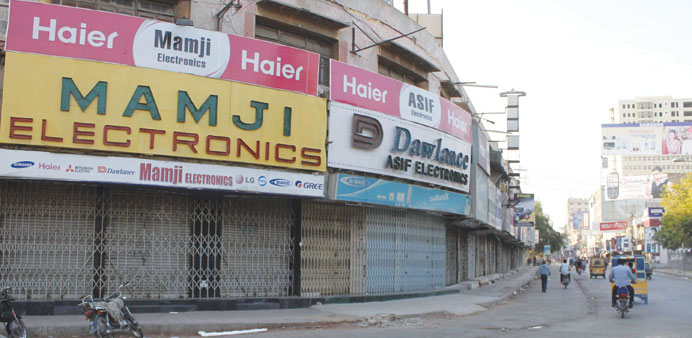|
|
|
An indefinite strike in Pakistan’s port city of Karachi was called off just hours after it began yesterday when a major political party withdrew its call for the shutdown. |
The Muttahida Qaumi Movement (MQM), which controls most of Pakistan’s largest city, announced the strike three days after a car bomb killed 50 people and wounded around 140 others in the Shia Muslim neighbourhood Abbas Town.
Businesses, shops, schools and transporters went on strike around 16:00 (1100 GMT) after the call was made early yesterday, but MQM brought the action to an end shortly after 20:30.
“We withdraw our decision for an indefinite strike because people from all walks of life especially traders approached us and said it would affect their businesses and overall economy,” Raza Haroon, an MQM leader, told reporters.
“We will announce future course of action later but we are not withdrawing from our demands including arrest of the attackers.
“Our peaceful protest will continue until the arrest of all culprits.”
The head of an organisation representing private schools in Karachi, Khalid Shah, who had earlier announced the closure of schools “until the security situation improves”, also withdrew his decision.
“We have decided to open schools from Thursday,” he said.
Sunday’s bomb was the fourth in a series of major attacks on the minority Shia community since January 10 that have killed more than 250 people.
While no one has yet claimed the bombing, the banned extremist Sunni outfit Lashkar-e-Jhangvi has said it carried out the previous attacks.
There has been widespread outrage at the government’s apparent powerlessness in the face of rising sectarian violence, which has raised alarming questions about the security of general elections due to be held by mid-May.
The MQM last month withdrew from the main ruling coalition in a move interpreted as a way of jockeying for political advantage as parliament prepares to dissolve in mid-March.
Karachi, a city of 18mn people, contributes 42% of Pakistan’s GDP but is rife with murders and kidnappings and has been plagued for years by ethnic, sectarian and political violence.
Campaigners warn the situation is getting worse.
Provincial paramilitary chief Rizwan Akhtar says his forces arrested 59 suspects over Sunday’s blast. Pakistani forces frequently detain people en masse after major bombings but few if any are ever charged.
The local government said earlier yesterday that Fayyaz Leghari, police chief of southern province Sindh, had been removed from his post over the bomb attack.
Leghari was also removed from his post in June 2011, after security forces shot dead an unarmed man in a public park. He was reinstated last year.
In a Supreme Court hearing in Karachi yesterday, chief justice Iftikhar Mohamed Chaudhry slammed the government and security agencies for negligence, demanding to know why heads had not rolled after Sunday’s attack.
“We’ll not allow anyone to enjoy public office at the cost of public taxes and do nothing to safeguard their lives and properties,” Chaudhry said.
“Those who died in the blast and others who are continuously being targeted in other terrorist acts are not foreigners. They are our own blood, they pay taxes for our salaries.”
Shops were also forced to close yesterday in the southern cities of Hyderabad, Mirpurkhas and Nawabshah after shootings were reported.

